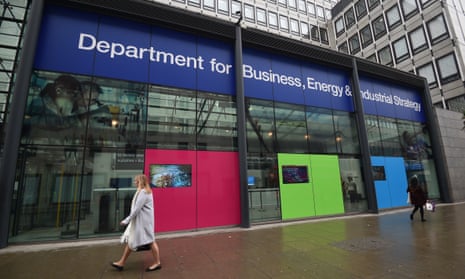Senior executives at hundreds of companies, including some that have profited from the pandemic, like Serco and Amazon, have been urged to come up with nominations for the 2022 new year honours list.
The names of more than 500 business leaders canvassed for suggestions of worthy recipients were inadvertently leaked as a result of a gaffe by the Department for Business, Energy and Industrial Strategy (BEIS), which accidentally released the top bosses’ direct email addresses.
The error – which appears to put BEIS in breach of GDPR rules governing the use of private data – occurred in an email sent to the bosses urging them to think about who to nominate for an honour and how best to go about putting names forward.
But instead of using the bcc (blind carbon copy) option, which disguises the recipients of a bulk email, the department used the cc option, meaning that everyone in the chain could see each other’s addresses.
The guidance offered to the recipients of the email includes how to write a successful nomination for staff who they think could be considered in the honours process.
Recipients of the email include Rupert Soames, the boss of outsourcing firm Serco, which has received criticism for handing out bonuses and dividends while benefiting from the government’s much-criticised £37bn test and trace scheme.
The email, seen by the Guardian, was also sent to the leaders of firms that have faced scrutiny over their tax arrangements and treatment of staff, such as Amazon and Deliveroo.
The bosses of FTSE 100 companies such as BT, Barclays Bank, Tesco and Burberry received the email, along with independent businesspeople who run small farm shops and hairdressing businesses.
Leaders of companies that work in defence, such as BAE Systems and Rolls-Royce, received the email, as did chiefs of Wall Street banks and Silicon Valley tech bosses at Facebook, Google, Amazon, Apple and Tesla.
Executives at automotive giants such as Nissan, BMW and Aston Martin were copied in, as were those of pharmaceutical companies producing Covid-19 vaccines, such as Pfizer and AstraZeneca.
A few received the email despite having resigned or been removed from their position.
One of those offered guidance on how to nominate staff was the former KPMG UK chair Bill Michael, who resigned last month after firing a broadside at employees and telling them to “stop moaning”.
Sacked Aston Martin boss Andy Palmer was on the list, as was the former Credit Suisse chief executive Tidjane Thiam – who was ousted after a spying scandal – and the email was also sent to Mike Coupe at Sainsbury’s. Coupe quit as chief executive of Sainsbury’s last year and now oversees testing in the NHS test-and-trace programme.
Other recipients included Andy Hornby, who runs the Wagamama-owning Restaurant Group and presided over the collapse of HBOS, and former George Osborne adviser Rupert Harrison, who now works for investment firm BlackRock.
Some were notable by their absence. The list featured the chief executive of online retailer Asos, Nick Beighton, but nobody senior from rival Boohoo, which has faced criticism over conditions at its garment factories in Leicester. JD Sports’ executive chairman, Peter Cowgill, is on the list, but the billionaire Sports Direct founder-boss, Mike Ashley, is not.
Almost every sector of British business was represented, although BEIS did not seek input from the tobacco or gambling industries.
After realising their mistake earlier on Wednesday, BEIS officials attempted to recall the email, apologised to recipients, and asked them to delete the list.
The Information Commissioner’s Office, which regulates data protection, can fine public bodies up to a maximum of £17.5m for breaches of GDPR.
The breach is not thought to be serious enough to warrant a fine, but it does offer an insight into how the government goes about helping big businesses ensure that their staff are nominated for honours.
Company leaders were invited to join one of three online forums on Zoom to help “demystify” the honours process. A guidance document attached to the email included advice on how to write a successful nomination.
In a separate letter, the BEIS permanent secretary, Sarah Munby, wrote: “I would like to draw on your knowledge and expertise to identify deserving individuals and ensure that their contribution is rewarded and celebrated in this very public way.”
Recipients were urged to pay particular attention to nominations that reflected regional representation and highlighted the work of disabled and BAME people.
Nominations are submitted to the Cabinet Office for consideration in the annual new year honours list.
A BEIS spokesperson said: “These emails do not indicate that any specific individual is being actively considered for new year’s honours and any nominations received still need to go through a comprehensive, independent consideration process.
“BEIS takes its information and data handling responsibilities very seriously under the UK GDPR. We have contacted the parties concerned to apologise for the error and taken steps to mitigate any further incidents.”
